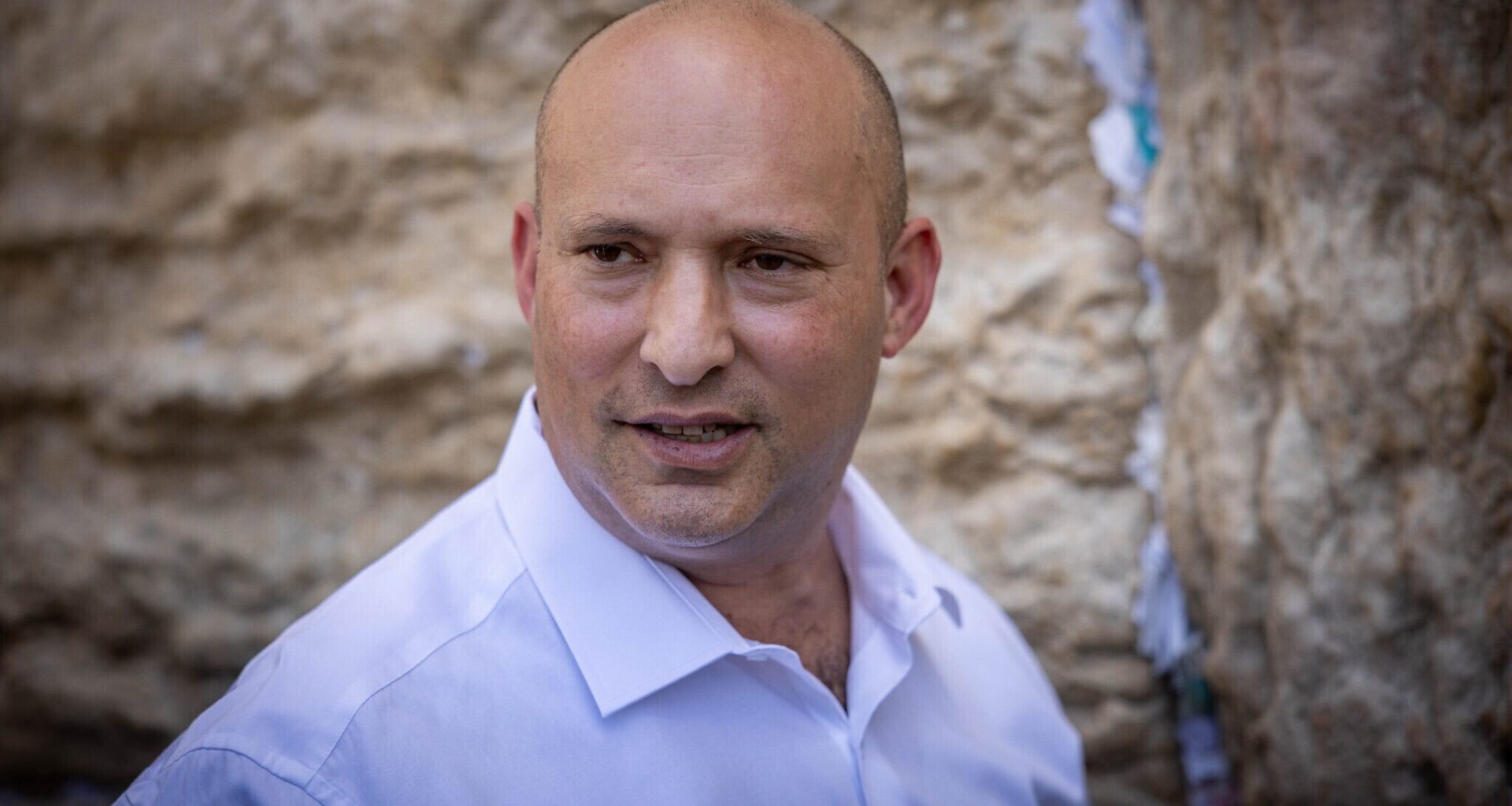Former prime minister Naftali Bennett tore into the government in a series of recordings published by Hebrew media Sunday, saying it was made up of “stupid” ministers and that he intended to unite the various opposition parties and figures to form a “big party” that could defeat Prime Minister Benjamin Netanyahu’s coalition in the next election.
Speaking at a conference in Kfar Saba on Thursday, in recordings obtained and published by the Walla news site, Bennett spoke of his disapproval of the government, his plans for uniting the opposition, and the domestic and foreign policy priorities that he would pursue if he were elected.
“Today the government is made up of stupid ministers,” said the former premier, who is thought to be planning another run at the country’s leadership in the 2026 election.
“Simply stupid, I have no other word for it,” he said. “When a minister says, ‘We should drop a nuclear bomb on Gaza.’ Great, you said it — now you’ve gathered 17 votes — from lunatics. Will we drop a bomb on Gaza? No, but we’re the ones paying the price.”
Bennett’s comments were referencing Heritage Minster Amichay Eliyahu’s November 2023 statement that dropping a nuclear bomb on the Gaza Strip was “an option” — a statement called “detached from reality” by Netanyahu.
Get The Times of Israel’s Daily Edition
by email and never miss our top stories
By signing up, you agree to the terms
The statement was later cited by South Africa in a motion accusing Israel of genocide before the International Court of Justice, prompting Eliyahu to brag that “even in The Hague they know my position.”

FILE: Otzma Yehudit chairman MK Itamar Ben Gvir with MK Amichay Eliyahu in the Knesset plenum, December 20, 2022. (Yonatan Sindel/Flash90)
Bennett said that during all his international interviews, he is confronted by interviewers asking about controversial statements made by Eliyahu and other far-right ministers, such as Finance Minister Bezalel Smotrich and National Security Minister Itamar Ben Gvir.
“So our soldiers are paying real prices by having their hands tied because of political stupidity done purely for political purposes,” he said.
“It’s a sin to just call it stupidity. It is worse. It’s evil, because they’re scraping together political votes here at the expense of our soldiers, some of whom won’t be able to travel abroad for the rest of their lives because of this madness,” he said.
In the recordings, the former premier didn’t just offer criticism of the government; he also laid out his political strategy for next year’s elections. “We need to form a national Zionist unity government based on the ‘alliance of service’: those who serve and who accept the government’s guiding principles,” he said.
“I have a role, and that is to unite the various centrist parties. We’ll talk to [Yisrael Beytenu party chairman Avigdor] Liberman, to [former Knesset member Gadi] Eisenkot, and get everyone into one big party,” he said, telling the conference that their role is to “convince everyone to vote for this party and win a clear and decisive majority.”
Bennett also said that, if this party were elected, his plan would be to “lay down a constitutional foundation” and “pass a constitution for Israel,” something that he said he had thought was “unnecessary” in the past.
“I changed my position in light of recent years,” he said, alluding to the Netanyahu government’s ongoing efforts to weaken the judiciary and consolidate power in the hands of the executive branch. “We must establish how a law is enacted, how a law is repealed, who repeals a law, with what majority, how judges are appointed.”
He also said that he intends to “pass a law within the constitutional process to limit the prime minister’s term to eight years.”

Prime Minister Benjamin Netanyahu speaks during a Fourth of July reception hosted by conservative US news network Newsmax in Jerusalem on August 13, 2025. (Ronen Zvulun / POOL / AFP)
Bennett also pledged to establish a state commission of inquiry into the failures surrounding the October 7, 2023, Hamas-led onslaught, saying it is a “moral sin” that one has not yet been formed.
Netanyahu has repeatedly ruled out investigating October 7 until the war is over, and has firmly rejected establishing a state inquiry, claiming half of the public would not have faith in its findings since they do not have faith in the integrity of the judiciary, which appoints its members
Another key issue the former prime minister addressed was Haredi integration into the military and workforce, saying, “We have no choice.”
While Bennett didn’t detail how he plans to implement or pass a conscription law that would lead to widespread enlistment, he acknowledged a shift in his priorities following the events of October 7.
Before the war, he said, “military service for the Haredim was, in my view, less important than employment and education,” but the shortage of combat soldiers has led him to change his stance.
Bennett also declared that Haredi schools that are not part of the state system — meaning those that don’t teach core curriculum subjects — should not receive state funding.
On foreign policy and the issue of Palestinian statehood, he said that under his leadership “no drastic steps will be taken” regarding the establishment of a Palestinian state, though he emphasized that he doesn’t view the situation in “binary terms.”

Former prime minister Naftali Bennett speaks during the Israel Information Technology Conference in Ness Ziona, May 5, 2025. (Avshalom Sassoni/Flash90)
“My views are hawkish-liberal. I oppose a Palestinian state, I oppose giving up land. I support maximum security and minimum friction with the Palestinians,” he stated.
“I support autonomy for the Palestinians, that they manage themselves — but they cannot receive sovereignty over the borders,” he said, hinting that he favors maintaining the status quo and supports the continued functioning of the Palestinian Authority, which many in the government have sought to weaken or dismantle entirely.
He also condemned crimes committed by the extremist Jewish settlers of the “hilltop youth,” who carry out near-daily attacks on Palestinians in the West Bank, while adding that “crime exists in cities across Israel as well.”
Responding to the leaked recordings, Bennett said the people of Israel “have a terrible leadership and we will replace it as soon as possible.”
Opposition Leader Yair Lapid, who was notably not mentioned in the leaked segments of Bennett’s speech, said after the recordings were published that he “will talk to [Bennett] again.”
“We need to do everything to bring down the government, to gather forces,” Lapid said, signaling that he would be willing to join forces with Bennett and the other opposition figures in a future coalition or party.

Left to right: Yisrael Beytenu chair Avigdor Liberman leads a faction meeting at the Knesset on July 14, 2025. (Yonatan Sindel/Flash90); Opposition Leader Yair Lapid leads a faction meeting at the Knesset, in Jerusalem, on August 4, 2025. (Yonatan Sindel/Flash90); Former prime minister Naftali Bennett visits at the Western Wall in Jerusalem’s Old City, May 26, 2025. (Yonatan Sindel/Flash90); Former MK Gadi Eisenkot holds a press conference after announcing his resignation from the Knesset and his departure from the National Unity party, in Tel Aviv, July 1, 2025. (Erik Marmor/Flash90)
Bennett, a former right-wing ally of Netanyahu, broke with him in 2021 and briefly unseated him, serving as prime minister for about a year. Ahead of elections scheduled for next year, he has registered a political party under the name Bennett 2026, which polls show would compete with Netanyahu’s Likud to be the largest in the Knesset.
Last month, Bennett met with Yusrael Beytenu’s Liberman after the latter called for the two to galvanize the “Zionist opposition party heads” to come up with a “basic outline” for the next government.
According to a poll published by Channel 12 last week, a union between Bennett and Liberman would be the biggest party if elections were held today, with 30 seats, as opposed to Likud with 25.
In such a scenario, the left-wing Democrats under Yair Golan would get 11 seats, a party headed by Eisenkot would get 10, and Lapid’s Yesh Atid would win eight, as would the Sephardi ultra-Orthodox party Shas.
The Ashkenazi Haredi United Torah Judaism and the far-right Otzmah Yehudit would both garner seven seats, the two Arab parties Hadash Ta’al and Ra’am would each get five seats, while Bezalel Smotrich’s Religious Zionism would scrape past the electoral threshold and get four seats, the poll found.
Benny Gantz’s Blue and White, and the Arab Balad party, would not make it into the Knesset.
The results indicate the opposition would be unable to form a government with 59 seats, unless it includes one of the Arab parties. The current coalition gets 51 seats.
The next Knesset elections are scheduled for October 2026.

